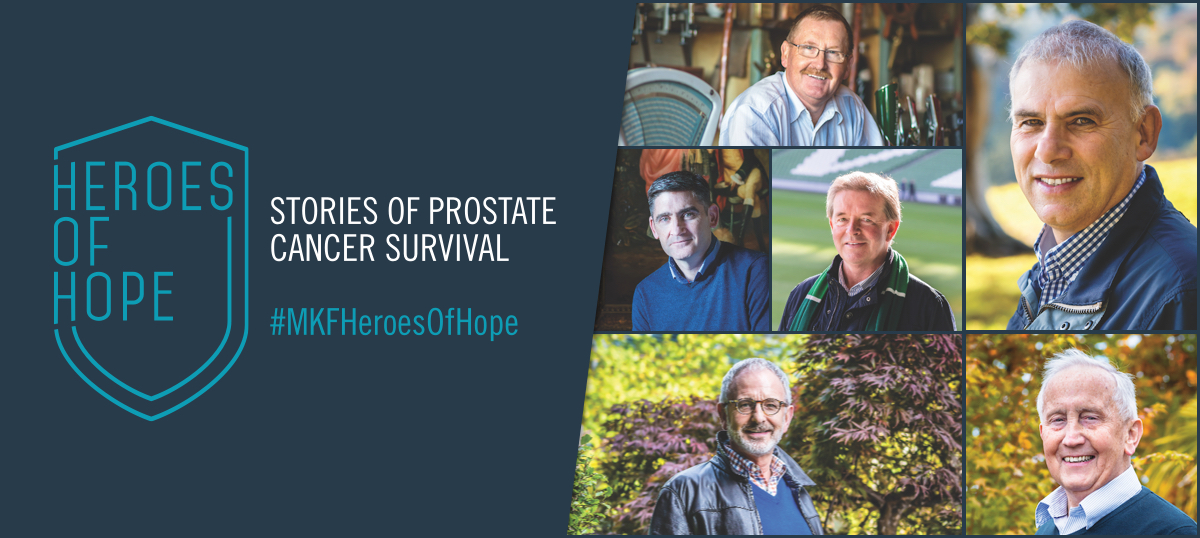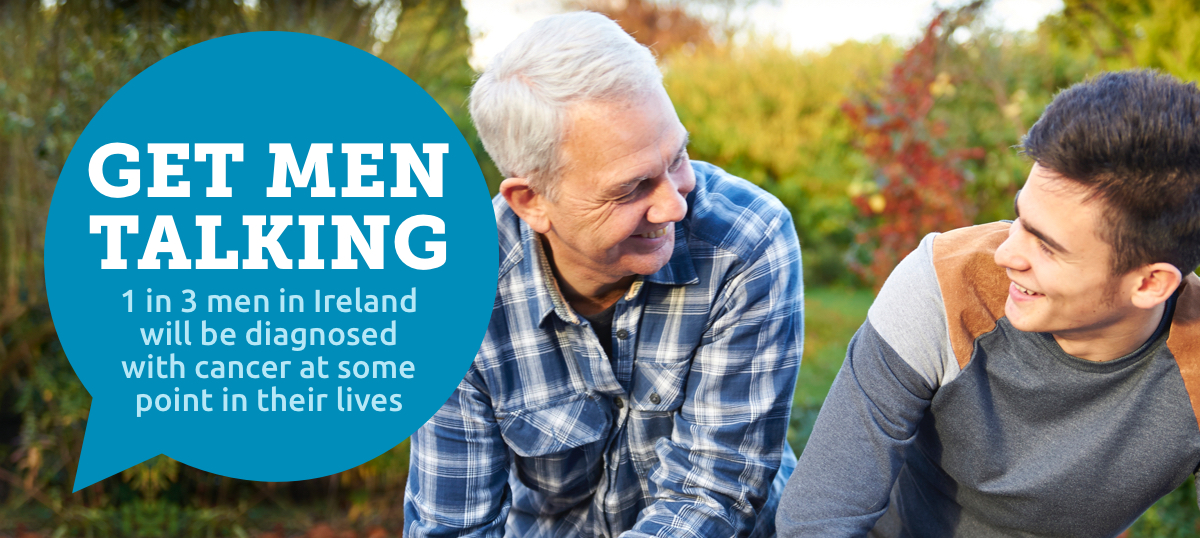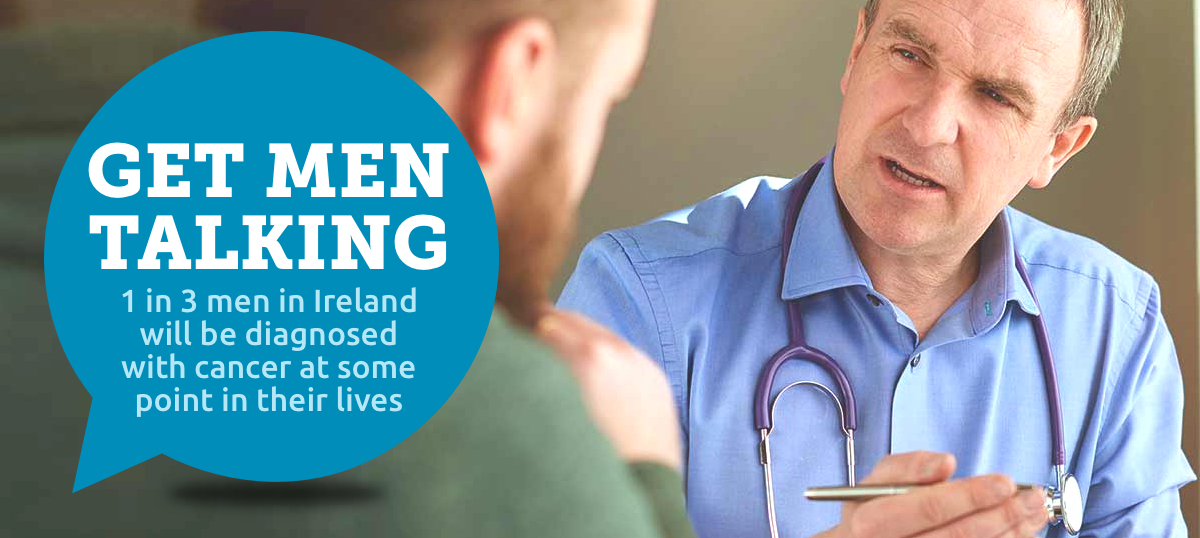Men are more likely to talk about the news, sports or the weather than they are about their health. But it’s time to Get Men Talking because 1 in 3 men in Ireland will be diagnosed with cancer at some point in their lives even though many cancers can be prevented and most treated successfully if caught early.
Most common cancers affecting men
The cancers that most often affect men in Ireland are prostate, bowel, lung, and skin cancers. Testicular cancer is the most common cancer in men aged 15-34. Knowing about these cancers, what to look out for and what you can do to help prevent them or find them early (when they are small and easier to treat) may help save your life.
This website has lots of information about how to reduce your risk of these common cancers and how to spot the symptoms early. It also has advice on what questions to ask your GP if you would like to talk to him or her about cancer.
Remember, if you have any concerns about your health, the most important thing to do is talk to your GP.
Arrange a visit from a Marie Keating Foundation nurse for your workplace, community centre or town
It’s time to Get Men Talking
Read about prostate cancer survivors

Over 3,400 men in Ireland are diagnosed with prostate cancer each year. However, over 90% will survive. Read the stories of 15 men who are living proof that while being diagnosed with prostate cancer will change your life, there is life after prostate cancer.
Prostate cancer
Prostate cancer is the most common male cancer in Ireland. One in eight men here will be diagnosed with it. Your chances of getting prostate cancer go up as you get older so if you’re over 50, talk to your GP about the PSA blood test every year. It’s quick, simple and your doctor will not need to perform a digital exam if your PSA is normal!
Prostate cancer can run in families. You need to be extra sure to talk to your GP about prostate cancer and the PSA blood test if your father, brother or uncle has had prostate cancer. You should also get your PSA levels checked if your mother or sister has had BRAC 1 or BRAC 2 breast cancer- this is the type of breast cancer that is caused by the ‘Angeline Jolie gene.’
Read more about the causes, symptoms and risk factors for prostate cancer here.
Bowel cancer
Bowel cancer is one of the most common cancers in Ireland. Over 1,440 Irish men are diagnosed with it every year.
It’s also known as colon cancer, rectal cancer, or colorectal cancer – depending on where in the bowel the tumour is.
Bowel cancer is usually diagnosed in people over the age of 55.
Your chance of developing bowel cancer is increased if you drink alcohol, smoke, are overweight, do not exercise, and eat a lot of red meat or processed foods.
Bowel cancer can be hereditary. If someone in your family has bowel cancer, you have a higher chance of developing it.
BowelScreen – The National Bowel Screening Programme offers free home test kits to men and women in Ireland aged 60 to 69 every two years. The BowelScreen programme will, over time, be offered to all people aged 55 to 74.
Find out more about the causes, symptoms, risk factors and free screening for bowel cancer.
Lung cancer
Of all the cancers, lung cancer is the biggest killer in Ireland.
Nearly 1,300 men are diagnosed with lung cancer every year in Ireland. Most lung cancers are due to smoking so if you do smoke, quit now. Visit Quit.ie or Freephone 1800 201 203
Lung cancer doesn’t display many symptoms in its early stages. But once the cancer develops, it will start to affect the lungs, and the symptoms may include:
- A persistent, worsening cough
- Coughing up excessive phlegm with blood
- Chest pain with coughing or breathing
- Recurring chest infections
- Weight loss
Find out more about the signs and symptoms of lung cancer as well as the risk factors.
Skin cancer
Women are more likely to get skin cancer than men. But men are more likely to die from it.
Skin cancer is the most common cancer in Ireland. You can prevent skin cancer by being SunSmart:
- Always wear sunscreen
- Sunscreen with UVA protection
- Avoid the sun between 11am and 3pm
- Wear protective clothing
- Never, ever use sunbeds
Check your skin regularly to see if any of your moles or freckles have changed in colour or size. If they have, talk to your GP straight away.
Find out more about the signs of skin cancer and how to prevent it.
Testicular cancer
Testicular cancer is the presence of cancer cells or a cancerous growth in or on the testicles.
Testicular cancer is the most common cancer in young men aged 15-34. However, it’s actually very rare and it’s very treatable if caught early enough.
You can’t do anything to prevent it but you can catch it early. That’s why you should check your testicles every month to make sure they are smooth, firm and comfortable. They should not feel lumpy or painful.
Remember, most abnormalities or lumps in your testicles turn out not be cancer, but if you notice anything unusual, get it checked out by a doctor straight away to make sure.
Find out more about testicular cancer.
The Marie Keating Foundation’s Get Men Talking campaign is proudly supported by:
![]()




